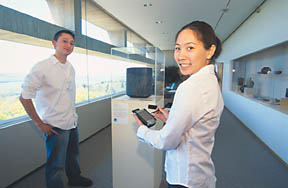New IS major is not just about computers -- it's about people
By Bill Steele

Computing isn't just for computer geeks any more. It is an essential tool for building online libraries, mapping the human genome, finding new stars, looking up legal precedents, animating movie dinosaurs and too much more to name. If you're interested in using computers as part of your job, majoring in "computer science" is like majoring in English literature if you want to be a journalist: close, but not right on the money.
So, Cornell's Faculty of Computing and Information Science (CIS), already an interdisciplinary organization, has created a new undergraduate major and a Ph.D. program in information science (IS), open to students in the Colleges of Arts and Sciences, Engineering and Agriculture and Life Sciences. A minor (or "concentration") in information science has been available in all seven undergraduate colleges since 2002. The first cadre of five students graduated with the new major last spring, and about 30 students graduated with IS minors. This year, 50 undergraduates are majoring in information science and 69 are minoring.
The difference between the two fields? Computer science is about how computers work. Information science is about what you can do with them and how best to do it. As the name implies, the focus is on information and how it can be stored, manipulated and retrieved. Information science also looks at the social, cultural, economic, historical, legal and political contexts in which information systems are employed and their impact on individuals, social groups and institutions.
Claire Cardie, associate professor of computer science and the Charles and Barbara Weiss Director of the Information Science program, sums it up: "The major looks at where computing meets people." Cardie, David Williamson, professor of operations research and industrial engineering, and David Shmoys, professor of operations research and industrial engineering, co-direct the Information Science, Systems and Technology (ISST) undergraduate major in the College of Engineering. Williamson is director of undergraduate studies for the IS major in the College of Arts and Sciences and the College of Agriculture and Life Sciences.
"I started out to be a computer science major, but I didn't want to be an engineer," explains Ross Housewright, who was among the first five IS majors graduating in 2005. "I was encouraged to take a broader range of courses, including psychology and socially oriented courses. I wanted to know how to apply technology to change how society works." Housewright has gone on to seek a master's degree in information science at the University of California-Berkeley, with a longer-term eye on law, advocacy and Internet social issues.
There is a place in information science for the classic computer geek, too. Will Kruse, another 2005 graduate, has a resume that bristles with programming languages and high-tech internships -- but the IS major, he says, "was the best decision I ever made. It really took all my interests and got them in one place." Kruse, who now works for a software security firm, notes that his job involves interaction with customers and understanding how users perceive their systems. "I feel that if I'd just done the CS routine I'd be a darn good coder but I wouldn't have the bigger picture," he says.
Cardie points out that the major still includes a lot of courses in computer science. "Students need courses in programming and human-computer interaction, math and statistics," she explains. There are 11 required core courses covering these areas in the Arts and CALS IS majors; the Engineering major also includes core courses from operations research in the area of management science.
In Arts and Agriculture and Life Sciences, students are offered three possible tracks beyond the core courses:
- Human-centered Systems -- the relationship between humans and information, drawing from human-computer interaction and cognitive science.
- Information Systems -- how digital information is represented, organized, stored, manipulated and accessed.
- Social Systems -- the cultural, economic, historical, legal, political and social contexts in which digital information is a major factor.
Students must take courses in all three tracks and pursue two of them in depth. Included are courses in cognitive psychology, the sociology of computing and human-computer interaction.
In the College of Engineering, students take more technical courses and have the options of concentrating in:
- Management Science, using computers for decision making, or
- Information Science, handling information in digital form.
Students selecting the IS minor are expected to take one or two courses in each track and a course in statistics. Hotel School students must include four of the school's own information systems courses, and engineering students must take an engineering-oriented statistics course.
According to the online description of the major, courses available in all three colleges cover electronic communication; knowledge networking; collaboration within and across groups, communities, organizations and society; the Web and Web information systems; natural-language processing; computational techniques in the collection, archiving and analysis of social-science data; information privacy; methods of collecting, preserving and distributing information; information system design; cognition and learning, and human interface design and evaluation.
An IS Ph.D. candidate is expected to take 600-level courses in four areas that echo the undergraduate tracks -- Information Systems, Human Computer Interaction, Cognition and Social Aspects of Information -- then pursue original, interdisciplinary research that focuses on one of those areas.
"We view computer science as more of a look-under-the-hood sort of major," Cardie says. "Computer science majors take some of the same courses, but have required courses on topics that aren't part of the IS major -- courses like computer architecture, operating systems and numerical analysis. Information science majors study things you need if your goal is to design applications for people."
Media Contact
Get Cornell news delivered right to your inbox.
Subscribe